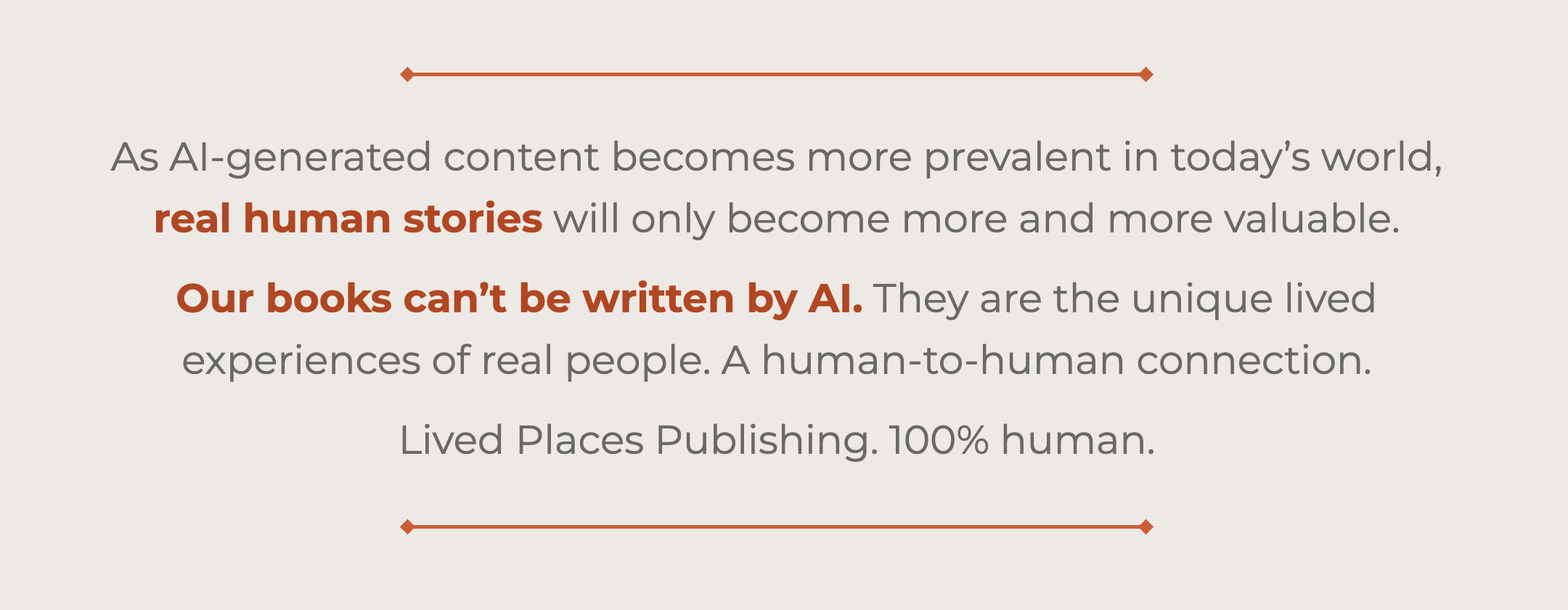In the spring of 2022, while watching 60 Minutes with my partner, it came clear to me that AI would have a large and positive impact on Lived Places Publishing and we needed to act. What was the trigger during this iconic news show? Scott Pelley finished a report on ChatGPT’s release by stating, for the first time but not the last, that the segment just viewed was entirely “human created.” Lived Places Publishing books are academic explorations about the lived experiences of people at the intersection of identity and place across interdisciplinary fields of study. Could AI replace this? I did not think so as I finished watching Scott Pelley close his segment, and so the next day we added this language to our homepage:
But I knew much, much more was required of our team in support of our authors as they and we, the publishing team, began to fold AI into our daily practice. I have arrived at three key points in our publishing and business operations:
1. Guidance on the use of AI
LPP books are about people, real people, living and experiencing the joys and challenges brought to play through identity in the context of place. Therefore, the original content we publish cannot be written by AI. To this end we added the following language to our author agreement: “You agree to confirm (and certify via notary public, if requested by the publisher) that this is an entirely human-generated original work. This guarantee excludes the use of artificial intelligence tools for the purpose of research, copy-editing, styling, and organizing the original work.” This requirement of our authors notably encourages them to deploy AI in the development of their book. On this point we have elaborated guidance (with the significant input of other publishers’ guidance) in our AI Policy.
2. Royalty and earnings from new opportunities created by the AI marketplace
Nobody can predict all the different ways a publisher of original content might monetize that content in an AI marketplace, but what is currently clear is that Large Language Models (LLMs) need vetted, reviewed, and trusted content to feed their knowledge foundation. In my view, authors must have choice to opt in to having their content included in such collective licensing deals, and they must be compensated. With this in mind, we added the following language to our author agreement in our Subsidiary Rights Section: “For collective licensing, such as in the licensing of the entire corpus of Lived Places Publishing titles in a specific subject, to a technology company to train a large language model used in an artificial intelligence product. In the case of a collective licensing agreement, you will be asked to opt in and your work will only be included upon your acceptance.” And our subsidiary rights royalties’ section is clear: 20% royalty or 50% of lump sum payments received by the publisher.
3. The use of AI to improve the writing output of our authors
We have made the least progress on the creation of tools, but we have identified, in discussion with our authors, where they would most like help from AI. LPP books are academic but not scholarly course-reading materials intended for advanced undergraduate and Master’s degree programs. We thus require every LPP book to include: Abstract, keywords, learning objectives, content warnings (when appropriate), recommended projects and assignments, suggested further readings, index, and references.
On each of these items, our authors have greater and lesser experience with creating a final, publishable output. For example, there is an ample research-informed practice in creating quality learning objectives and most LPP authors find this to be a new and challenging requirement where AI writing tools can dramatically improve the final product. Our aim is to develop such AI tools for our authors and reader’s benefit. More to come. At LPP we maintain a close and frequent dialogue with our author and collection editor community. We seek to understand their needs and wants and to place them at the forefront of how we run our business. Evolution is constant; revolution is less common. AI is a revolution and each of us, grappling with AI in the context of publishing, need to be concrete and clear in how AI will impact our content and, above all else, our content creators.




